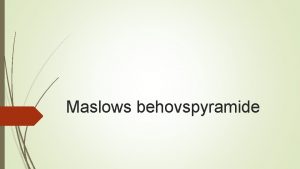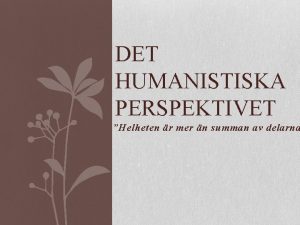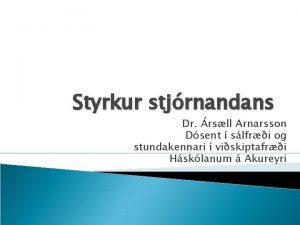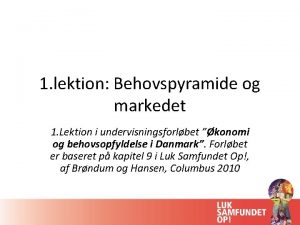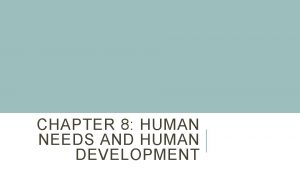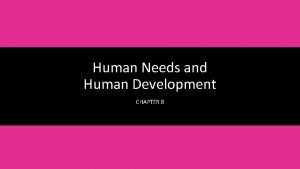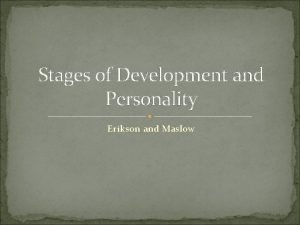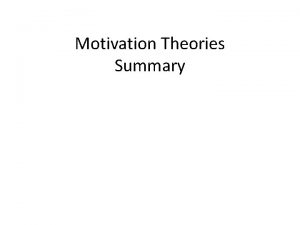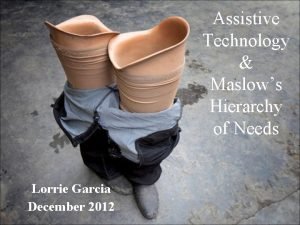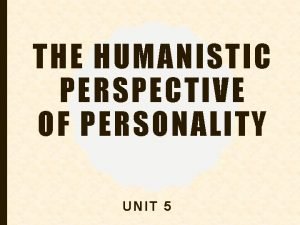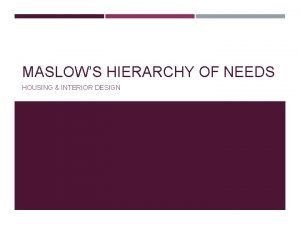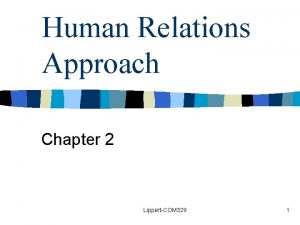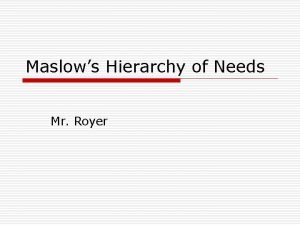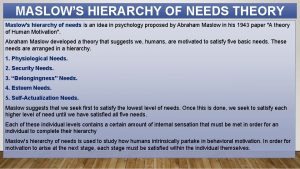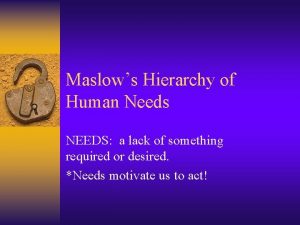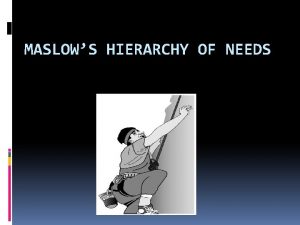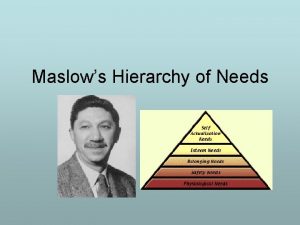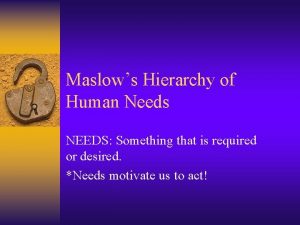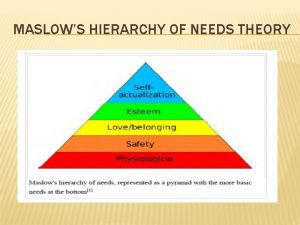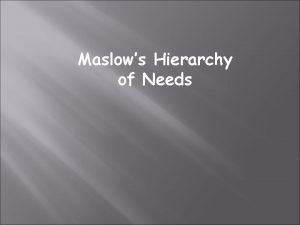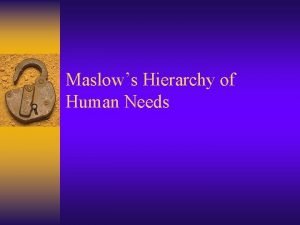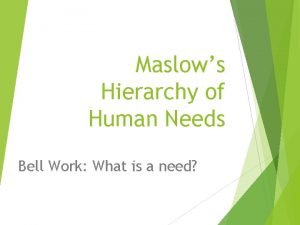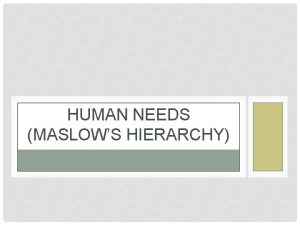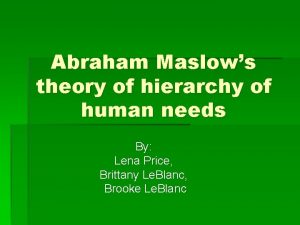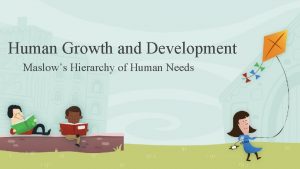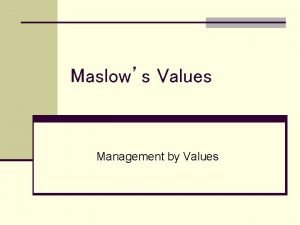Maslows Hierarchy of Human Needs NEEDS a lack





















- Slides: 21

Maslow’s Hierarchy of Human Needs NEEDS: a lack of something required or desired. *Needs motivate us to act!

Abraham Maslow Background Born April 1, 1908 in Brooklyn, NY One of seven siblings Married to first cousin Died June 8, 1970 Education City College of New York Studied Law University of Wisconsin Bachelor of Arts Degree in Psychology- 1930 Master of Arts Degree in Psychology – 1931 Ph. D Psychology- 1934 (newworldencyclopedia. org, 2008)

Abraham Maslow Research ¨ First to study the Psychology of Health ¨ Human Sexuality ¨ Humanistic Psychology “What a man can be, he must be. ”

Theory Origin & Description 1941 Ø Influenced by Kurt Goldstein who introduced him to the idea of self-actualization Ø His own close encounter with death had an impact on his outlook on life and self-actualization Ø Maslow’s humanistic psychology focused on the development of healthy people

Description of Maslow’s Hierarchy of needs Maslow’s theory is based on the idea that some needs, physical as well as psychological, take precedence over others. The needs are placed in a pyramid with the most important making the base If the basic needs are not met, the base of the pyramid is not formed and the rest of the needs are not achieved. (Learning-Theories. com, 2008)

The first levels of needs are the deficiency needs, those that if not met cause a deficiency, or lack that motivates a person to strive to achieve the need. The fifth level, the actualization level, is a growth level. Few people ever reach the growth level and spend their lives going up and down the pyramid meeting the lower level needs. Maslow defined a Hierarchy of Human Needs that stated the lower needs must be met before an individual can strive to meet the higher needs. (Learning-Theories. com, 2008)

Self-Actualization Needs Problem -Solving, Art, Beauty, Freedom Personal Fulfillment, Creativity As an individual becomes more self-actualized, one becomes wiser and automatically knows what to do in a wide variety of situations Social Needs Friendship, Family Belonging, Identity Esteem Needs Self Esteem, Confidence, Justice, Respect, Recognition Safety Needs Security of the body, Health and Property Physiological Needs Food, Water, Sleep

Theory Description Maslow’s Theory A hierarchy of important processes that are critical for development and growth of the total person (Mc. Ewen & Wills, 2007). ¨ Lights! Camera! Action! You. Tube Video on Maslow’s Hierarchy of Needs

PHYSIOLOGICAL-necessary for life; unmet, these needs lead to death ¨ Food ¨ Water ¨ Oxygen ¨ Sleep ¨ Protection from extreme temperatures ¨ Elimination ¨ Sensory needs ¨ Motor needs

SAFETY/SECURITY ¨ The need to be free from anxiety and fear ¨ The need to be secure in the environment ¨ The need for order and routine

LOVE AND AFFECTION ¨ Social acceptance, friendship, to be loved ¨ Need to belong, to relate to others ¨ Sexuality -a person’s feelings/attitude toward their masculine/feminine nature ¨ Sexuality -the ability to give and receive love and affection -reproductive capabilities

ESTEEM ¨ Feeling important and worthwhile – includes respect, approval, appreciation ¨ We engage in activities that bring achievement, success, and recognition ¨ We gain self-confidence and begin to direct our actions toward becoming what we WANT to be

SELF-ACTUALIZATION ¨ Self-realization; obtaining our full potential; becoming confident, eager to express our beliefs, and willing to reach out to others to help them

To meet our human needs ¨ We usually learn what works by trial-and-error ¨ Direct methods v. Indirect methods ¨ Stress reactions ¨ Challenges and responsibilities

DIRECT METHODS ¨ Hard work ¨ Setting realistic goals ¨ Cooperating with others ¨ Evaluating effectively

INDIRECT METHODS ¨ Suppression ¨ Projection ¨ Denial ¨ Rationalization ¨ Compensation ¨ *Note: These are unhealthy when used too often, but sometimes allows us to cope!

When defense mechanisms are inadequate, stress reactions develop: ¨ Chronic complaining and demanding behavior ¨ Agitation with manipulative behavior ¨ Restlessness ¨ Sleeplessness ¨ Depression-be alert for potential suicide ¨ Withdrawal

Application to Nursing Practice Maslow’s hierarchy of needs is easily applied to nursing practice. The theory focuses on human potential, “gives hope a chance”. The theory allows the nurse to highlight the person’s strengths instead of focusing on one’s deficits (Mc. Ewen & Wills, 2007). Basic needs such as air, food, drink and warmth , are the basic needs of human survival and health. Safety, be it with ambulation or in taking medication, is very important to nursing.

Social needs are met with visiting hours and through the nurse-patient (care-giver) relationship Esteem and self-actualization may or may not be met in the hospital setting. The theory provides the blueprint for prioritizing client care according to a hierarchy of needs (Mc. Ewen & Wills, 2007).

Personal Nursing Practice Keesha~ “I utilize Maslow’s Hierarchy while caring for patients in the hospital setting. It’s imperative in this line of work to address our patient’s individual needs (all of which are listed n Maslow’s hierarchy). As nurses, our nursing care encompasses finding the inherent goodness in people. By assisting patients in meeting their needs, there’s a sense of achievement and satisfaction had by all. As we satisfy our physiological needs including food, shelter, water we can better address our safety and emotional needs. When we meet our esteem needs we are better communicators, listeners, educators, therefore satisfy our social needs. Self-actualization needs appear to be more complex for some patients and nurses, but with time are attainable. ”

Criticism There are many criticisms to Maslow’s theory There is no explanation for those that put themselves in danger to help another. There are some cultures that put social needs above other basic needs. There is no explanation for the “starving artist”, the person who will give up food and drink in deference to their art. (Net. NBA, 2002 -2007) There’s minimal evidence to suggest that Maslow’s needs are in a hierarchical order Wahba & Bridwell (1976) claim that Maslow’s definition of self-actualization is difficult to test scientifically and found little evidence for the ranking of Maslow’s needs or any existence of a definite hierarchy Maslow’s theory has been challenged by other theorists who hypothesize that there are only three levels of human needs
 Maslows behovstrappa
Maslows behovstrappa Maslow’s theory maintains that
Maslow’s theory maintains that Maslows behovspyramide eksempler
Maslows behovspyramide eksempler Købemotiver
Købemotiver De 12 sygeplejefaglige problemområder virginia henderson
De 12 sygeplejefaglige problemområder virginia henderson Carl rogers teori
Carl rogers teori þarfapýramídi maslows
þarfapýramídi maslows Behovspyramiden
Behovspyramiden Human needs and human development
Human needs and human development Chapter 8 human needs and human development
Chapter 8 human needs and human development Erikson vs maslow
Erikson vs maslow Erikson's hierarchy of needs
Erikson's hierarchy of needs Abraham maslow hierarchy of needs summary
Abraham maslow hierarchy of needs summary Individual family community
Individual family community Maslow's hierarchy of needs technology
Maslow's hierarchy of needs technology Humanistic perspective of personality
Humanistic perspective of personality Maslow 1943 harvard reference
Maslow 1943 harvard reference Hierarchy of mental health needs
Hierarchy of mental health needs Who said that
Who said that Hierarchy in interior design
Hierarchy in interior design Mate acquisition meaning
Mate acquisition meaning Abraham maslow developed his hierarchy of needs
Abraham maslow developed his hierarchy of needs


